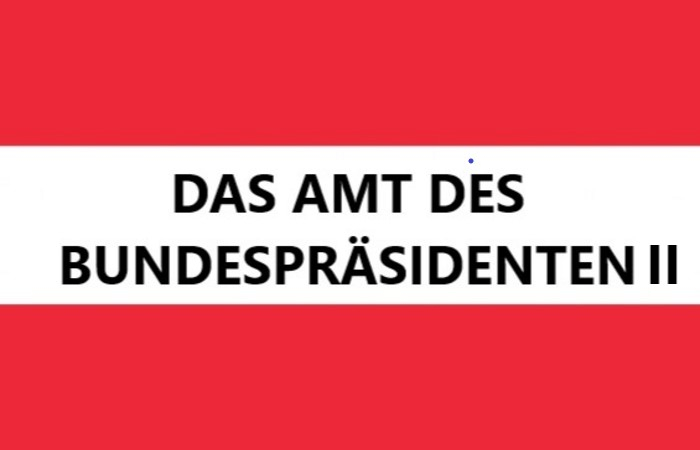The Office of the Federal President II
Understanding of office and end of office
In our News on the Federal Presidential Election of September 29, 20022 (The Office of the Federal President I), the constitutional competencies, the election process and the acquisition of an election card were highlighted.
Questions that are still open, such as the end of the term of office of the Federal President and the understanding of the office of the previous heads of state, are dealt with here:
Understanding of office over time
During the 2016 presidential election campaign, at the latest, Norbert Hofer's statement "You'll be surprised what will go" reignited the discussion about the federal president's understanding of office.
While federal presidents before Thomas Klestil tended to limit themselves to the representative function and that of the "formal state notary," since 2000 there has been an increasingly strong intervention in day-to-day politics.
In 2000, for example, Thomas Klestil demanded that Wolfgang Schüssel and Jörg Haider sign a preamble before the inauguration of the federal government. He also definitively ruled out appointing Thomas Prinzhorn or Hilmar Kabas as ministers in advance.
His successor, Federal President Fischer, refused to sign a law that had been formally passed in conformity with the constitution but contained a provision whose content was obviously unconstitutional, thus deviating for the first time from purely formal certification.
The current incumbent, Alexander Van der Bellen, has so far intervened most strongly in day-to-day politics. Allegedly, in the run-up to the government negotiations between the FPÖ and the ÖVP, he already submitted a "blacklist" of people he would not appoint as ministers under any circumstances. In addition, he refused to confirm the promotions of three brigadiers appointed by FPÖ Defense Minister Mario Kunasek. Furthermore, he refused to appoint a lawyer nominated by the FPÖ as a constitutional judge. Above all, however, he was the first federal president to dismiss a minister, namely the then FPÖ interior minister and now federal party chairman Herbert Kickl.
It is hardly surprising that the current candidate for the federal presidency, Walter Rosenkranz, promises to be no less active than his predecessors if he is elected.
End of office of the Federal President by lapse of time or death
Usually, the office ends automatically by expiration of time, namely six years after the inauguration of the Federal President. After that, a single re-election is permissible. This case applies to Heinz Fischer, for example.
However, the term of office of his immediate predecessor ended in a dramatic way, namely by death. Thomas Klestil died in 2004 two days before the end of his second term.
End of term of the Federal President by referendum
The end of the term of office of the Federal President can also be effected by means of a referendum. This first requires a motion by the National Council to convene the Federal Assembly on this issue. If such a resolution is passed, the Federal Chancellor shall convene the Federal Assembly. It shall decide on the motion to call a referendum on the removal of the Federal President.
Termination of office of the Federal President by legal "misconduct
If Parliament considers that the Federal President is in breach of the Federal Constitution, both the National Council and the Federal Council have the option of passing a resolution to impeach the Federal President before the Constitutional Court. In this case, the Federal Chancellor must also immediately convene the Federal Assembly, which must pass the final resolution to impeach by a two-thirds majority.
A court conviction of certain criminal acts (e.g., misdemeanors carrying more than one year's imprisonment) would also lead to an end of office.
Termination of office by resignation
The Federal Constitution contains no provision on the resignation of a Federal President (resignation from office), which is why this possibility is controversial.
Replacement of the Federal President
If the Federal President is prevented from taking office "at short notice" (e.g. due to illness or during stays outside the EU area), his or her duties are transferred to the Federal Chancellor - but only for a maximum of 20 days. After that, the three presidents of the National Council take over, with the three presidents deciding by majority vote. If one of the three presidents is unavailable, the higher-ranking president has the casting vote; if two presidents are unavailable, the remaining president decides alone.
In the case of a so-called "permanent discharge" of office (e.g. death) or in the case of a resolution of the National Council to convene the Federal Assembly, the purpose of which is to bring about a decision on the holding of a referendum on the removal of the Federal President, the college of the three Presidents of the National Council shall immediately take over the representation (Art. 60 para. 6 B-VG).
